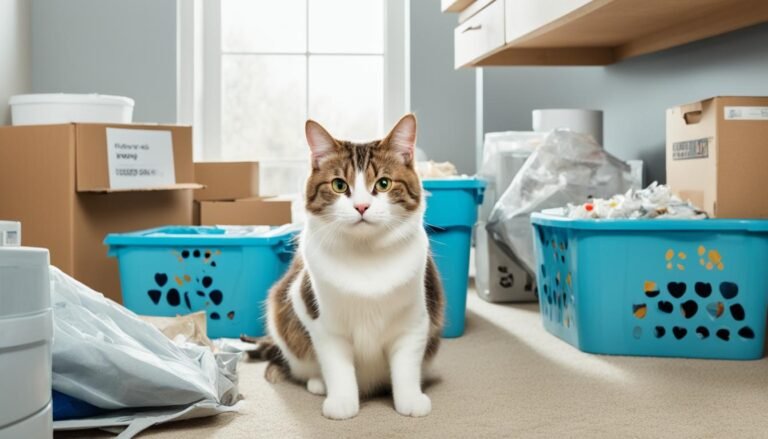Why Does My Cat Sleep with Me? Unveiling the Secrets
Cats are often seen as aloof and independent creatures. Yet, they can be surprisingly affectionate, especially around bedtime. Many cat owners don’t delve deeply into the reasons behind their feline’s choice to sleep alongside them. After all, having a cuddly companion is a delightful treat.
Nonetheless, there are concrete reasons why your cat prefers to snuggle with you during the night. Gaining insight into these motivations is invaluable for enhancing both care and connection with your feline friend.
Several factors that encourage your cat to perch on your lap also draw them to join you in bed. Let’s explore what drives this endearing cat behavior.
Why Does My Cat To Sleep With
To understand why your cat enjoys sleeping with you, let’s delve into the top reasons that explain this cozy behavior.
Seeking Warmth
Cats prioritize comfort and warmth, making them seek out the coziest spots in your home. This could be your lap, a sunny window sill, or even your laptop when it’s warm. With a body temperature slightly higher than ours—around 102°F—cats need extra warmth to stay comfortable without exerting themselves. This search for warmth can be more pronounced in kittens, sick cats, or certain breeds that crave extra heat.
Territorial Claims
Domestic cats, like their wild ancestors, are territorial creatures. Much of their affectionate behavior is about marking their territory. This includes you and your bed. By sleeping beside you, your cat is essentially claiming you as part of their domain, a behavior underscored by actions like head-rubbing or kneading. While this can sometimes lead to aggressive territorial behaviors, it usually manifests as your cat leaving its scent around to signal ownership to other cats.
Safety and Security
Cats feel vulnerable while sleeping, so they naturally seek out safe places. By choosing to sleep next to you, your cat is expressing trust and a sense of security in your presence. This behavior is rooted in their kittenhood, where sleeping close to their mother and littermates offered protection. Cats also learn from observation; if they notice you often resting in a particular spot, they might associate it with safety and comfort, enhancing their likelihood of sleeping there too. Additionally, familiar spots associated with positive experiences, like receiving affection, can also become preferred sleeping spots.
Trust and Affection
A primary reason your cat chooses to sleep with you is trust. Sleeping is a vulnerable time for cats, and by choosing your company, your cat is showing that it feels safe and protected with you. This is indeed a heartwarming gesture of trust and affection.
Moreover, cats use this close contact as a way to strengthen the bond between you. Though often perceived as solitary animals, cats are quite social within their own circles. They may cuddle with other cats in the home or choose you as their cuddle buddy, using these moments to reinforce social bonds. Furthermore, the affection your cat shows by sleeping with you can be seen as reciprocal care. Just as you look out for your cat, it too shows care by providing warmth and a sense of security. This mutual care is not only practical but also a sweet demonstration of love. Your cat is not just a pet; it’s a companion that cherishes and looks out for you, just as you do for it
Why Do Cats Sleep on Particular Body Parts?
Cats often choose to sleep with their owners, but the positions they select can sometimes be quirky and even a bit inconvenient. Many cat owners have shared tales of their feline friends adopting odd sleeping arrangements—from resting on their faces to turning their backs while snuggled up.
As with most of their behaviors, there’s a rationale behind these peculiar sleeping habits. Understanding the reasons can help you feel more understanding and patient with your furry friend. Once you realize why they do what they do, you might find yourself more willing to indulge these little quirks of your whiskered companion.
Why Does My Cat Sleep on My Head?
This query is often raised by cat owners, and there are three clear reasons why cats choose to sleep in seemingly unusual ways.
Firstly, your head is a significant source of warmth. Since cats are always seeking cozy spots, it makes sense they’re drawn to the warmest part of your body.
Secondly, your head moves less during sleep compared to other body parts. Cats prefer stability while resting, and a stationary head offers a calm, undisturbed spot.
Thirdly, your head carries a unique scent, possibly from your hair products or your natural aroma. Cats are highly scent-oriented and may be comforted or drawn to the familiar scent of their owner.
It’s worth noting that in some instances, a cat’s preference for sleeping on or near your head could indicate a desire for control or an assertion of dominance. Particularly with breeds known for their assertive or territorial nature, this behavior might necessitate setting boundaries, such as providing a separate sleeping space for your cat.
Additionally, aggressive or territorial behaviors can stem from various underlying issues, including medical conditions, stress, or insufficient socialization. Understanding these factors is crucial in managing and responding to your cat’s sleeping habits effectively.
Why Does My Cat Doze Off on My Chest?
Another favorite resting place for cats is on their owner’s chest. This spot is particularly appealing to felines because it allows them to feel the rise and fall of your breathing and the steady beat of your heart.
Much like humans find comfort in the soothing purr of a cat, felines are similarly comforted by the rhythmic pattern of their owner’s breathing. When we sleep, our bodies are in a state of relaxation, and the gentle, steady breathing provides a calming effect for our pets. This connection not only comforts your cat but also strengthens the bond between you and your feline companion as you share these peaceful moments together.
Why Does My Cat Turn His Back to Me?
Let’s set the record straight: when your cat turns its back to you while sleeping, it’s not a sign of annoyance or displeasure. Quite the opposite, this behavior is a profound display of trust.
When your cat turns away from you, it shows they feel secure enough to let their guard down in your presence—they don’t feel the need to watch you constantly. This position allows your cat to face outwards, ready to monitor the environment for any potential threats. Essentially, your cat is taking on the role of a lookout, ensuring both your safety and theirs. This protective stance is just another way your cat demonstrates its trust and affection towards you.
Should You Sleep Next to Your Cat?
While it may seem charming to have your cat sleep with you, it’s worth considering both the benefits and potential drawbacks to determine if this arrangement suits your lifestyle.
Benefits
- Emotional and Physical Comfort: The presence of your cat can be soothing. Petting your cat releases endorphins, promoting relaxation and reducing stress. The rhythmic purring of a cat has been known to calm many owners.
- Warmth and Companionship: Sharing your bed with your cat can enhance your comfort levels at night, providing warmth and companionship. This can be particularly beneficial if you have busy days and look forward to nighttime bonding with your pet.
Disadvantages
- Nocturnal Activity: Cats are naturally nocturnal, so while they might start the night curled up with you, they’re likely to get up during the night. Their movements can disrupt your sleep.
- Restricted Movement: If your cat decides to sleep on you, it might restrict your movement in bed. While you can move your cat, they might settle in a spot that’s more comfortable for you both eventually.
- Hygiene Concerns: Cats can carry parasites or bacteria, especially if they use a litter box or go outdoors. Maintaining your cat’s health through regular vaccinations and treatments for fleas and worms is crucial.
- Safety with Children: Cats may instinctively want to sleep with young children in the household, seeing themselves in a protective role. However, cats might react unpredictably to the abrupt movements or loud noises from children, posing a risk. It’s advisable to supervise interactions between cats and young children closely.
If you find the cons outweigh the pros, consider setting up a dedicated and comfortable spot for your cat to sleep. This way, your cat still feels close to you without the drawbacks of sharing your bed.
Frequently Asked Questions (FAQs)
What does it mean when a cat sleeps with you?
When a cat chooses to sleep with you, it often means they feel safe, secure, and comfortable in your presence. It’s a sign of trust and affection, as sleeping is a vulnerable time for cats.
Do cats sleep with their favorite person?
Yes, cats often sleep with their favorite person. This behavior is a way for cats to show love and trust. If a cat feels a strong bond with someone, they are more likely to want to be close to them, especially during restful periods like sleep.
Why does my cat like sleeping with me so much?
Cats may choose to sleep with you for several reasons: your body provides warmth, your presence is comforting, and your bed is a secure environment. Cats also might be drawn to your scent and the rhythmic sound of your breathing, which can be soothing.
Where your cat sleeps on your bed and what does it mean?
The location where a cat sleeps on your bed can vary, and it often has specific meanings this may be because your head emits warmth, and it’s a spot where they can feel secure without being moved too much. Cats may choose this spot to feel the comforting rhythm of your heartbeat and breathing. This might indicate a desire for closeness but also a respect for personal space. It allows them to stay close without too much contact.
Final Thoughts
While there might be some drawbacks to letting your cat sleep in bed with you, understanding this behavior from a feline perspective can enhance your ability to care for and connect with your pet.
The reasons why your cat chooses to sleep in your bed highlight their deep need for affection and comfort. Whether drawn by the warmth you provide, comforted by your scent, or seeking protection, it’s entirely natural for your cat to want to be close to you during the night.
This behavior is a testament to the bond you share with your cat and their inherent need for security and companionship. Recognizing and appreciating these motivations can help you make informed decisions about your sleeping arrangements that cater to both your needs and your cat’s well-being




